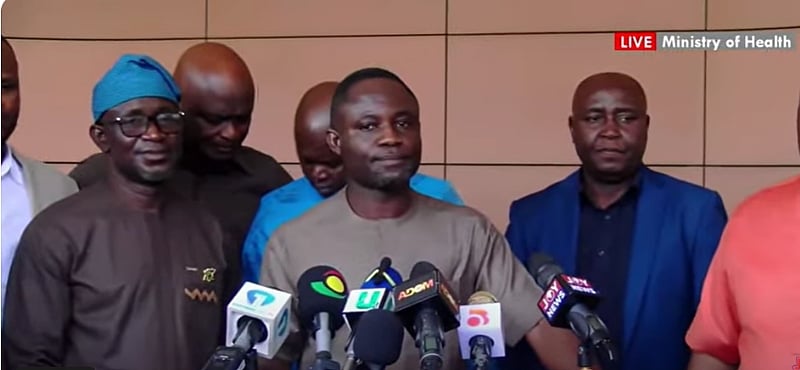The unexpected visit of Ghana’s Health Minister, Kwabena Mintah Akandoh, to the Tamale Teaching Hospital (TTH) on April 22nd sparked a heated controversy that has exposed underlying tensions within the nation’s healthcare system. The visit, prompted by the tragic death of a patient allegedly due to a lack of functioning ventilators, resulted in a public confrontation between the Minister and Dr. Valentine Akwulpwa, the Head of the Accident and Emergency Department. A video of the exchange went viral, fueling public debate and culminating in a strike by the Doctors Association of Tamale Teaching Hospital (DATTH), which suspended emergency and outpatient services indefinitely. The incident has raised critical questions about resource allocation, professional respect, and the appropriate channels for addressing systemic challenges within the healthcare sector.
Central to the dispute is the perception of disrespect displayed by the Minister towards the medical staff at TTH. The DATTH cites “unwarranted attacks” and demands an apology for the manner in which the Minister conducted himself during the visit. They argue that the Minister’s actions, perceived as accusatory and confrontational, undermined the professional integrity of the medical staff and exacerbated an already tense situation. The suspension of services underscores the depth of their grievance, emphasizing the importance of mutual respect between policymakers and healthcare professionals in ensuring the effective delivery of crucial medical services. The doctors have made the restoration of services contingent upon receiving an unconditional apology from the Minister and the provision of essential medical equipment, highlighting the resource constraints that underpin the crisis.
Minister Akandoh, in an attempt to mitigate the escalating conflict, held a press briefing on April 24th where he offered a personal anecdote intended to demonstrate his understanding of the challenges faced by the healthcare system. He recounted his own experience of needing emergency medical care, emphasizing his appreciation for the critical role played by health professionals. He further asserted his respect for doctors and health workers, stating that disrespecting them would be the “last thing” he would do, while also noting that “respect is reciprocal.” This attempt to bridge the divide, however, has been met with skepticism, particularly given the subsequent dismissal of TTH’s Chief Executive Officer, Dr. Adam Atiku. This action has further inflamed the situation, prompting accusations of punitive measures and disregard for due process.
The dismissal of Dr. Atiku has drawn condemnation from the Ghana Medical Association (GMA), who view it as a blatant act of retribution and a dangerous precedent for bypassing established procedures. The GMA’s demand for an apology from the Minister adds another layer to the ongoing dispute, underscoring the broader implications of the incident for the relationship between the Ministry of Health and medical professionals across the country. The GMA’s condemnation of the dismissal broadens the conflict beyond the immediate circumstances at TTH, highlighting systemic concerns about the governance and management of healthcare institutions in Ghana.
The unfolding situation reveals a complex interplay of factors contributing to the crisis at TTH and beyond. The initial incident, triggered by a patient death attributed to a lack of working ventilators, exposed a critical deficiency in essential medical resources. This, coupled with the Minister’s handling of the situation, ignited deeper grievances related to professional respect and the challenging working conditions faced by healthcare professionals. The DATTH’s strike action reflects not only their immediate concerns regarding the Minister’s actions but also their broader frustration with the persistent resource constraints that hamper their ability to provide adequate care. The GMA’s involvement elevates the issue to a national level, emphasizing the systemic nature of the challenges faced by healthcare providers across Ghana.
Moving forward, resolution requires addressing the multifaceted nature of the conflict. While the Minister’s attempts to express respect and willingness to cooperate represent a starting point, rebuilding trust will require concrete actions that demonstrate genuine commitment to addressing the concerns of healthcare professionals. This includes not only providing the urgently needed medical equipment but also engaging in a transparent and accountable process to investigate the circumstances surrounding the patient’s death and the subsequent dismissal of Dr. Atiku. Furthermore, a broader dialogue is essential to address the systemic issues plaguing Ghana’s healthcare system, including resource allocation, working conditions, and the relationship between policymakers and healthcare providers. Only through such a comprehensive approach can Ghana hope to build a sustainable and effective healthcare system that serves the needs of its citizens and values the contributions of its dedicated healthcare professionals.














